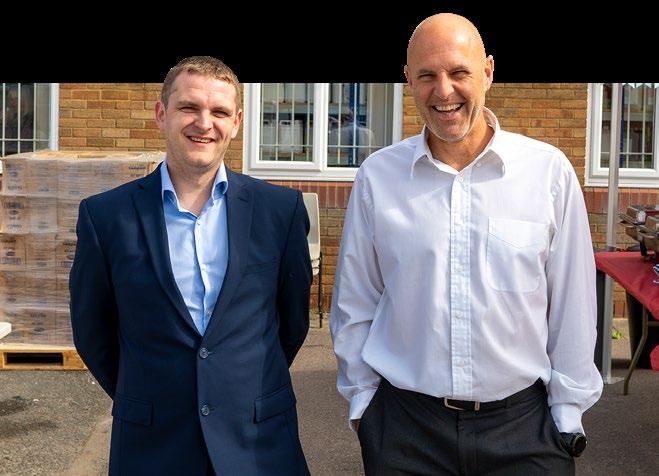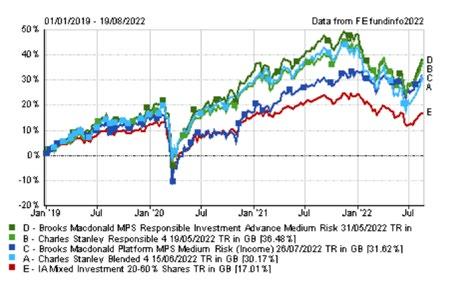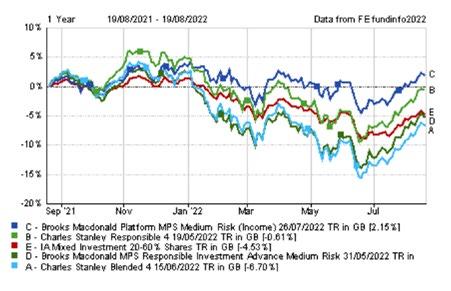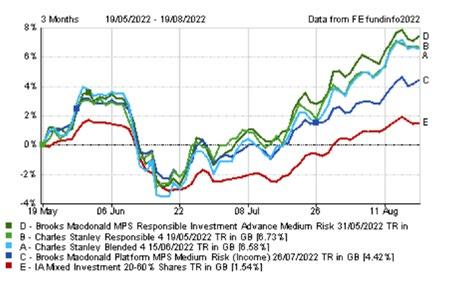Business Matters
Welcome to the autumn issue
In this issue we visit our client Raigins Group Ltd, (page 05) to find out how they weathered the COVID-19 storm, the changes they have implemented since then and the challenges that continued growth of a business can sometimes bring.

We feature an update on Making Tax Digital for Income Tax Self Assessment (MTD for ITSA), provide a timely reminder for trustees following the recent deadline for registering trusts, and provide an updated article on the tax benefits of buying an electric car.

We also feature an article by County Associates (UK) LLP to help to dispel the myths around ESG (environmental, social and governance) investments. We hope you enjoy reading this issue.
McCabe Ford Williams Newsletter | Autumn 2022 09
 ESG INVESTMENTS
TAX BENEFITS OF ELECTRIC CARS
MTD FOR ITSA UPDATE
Raigins Group Ltd Directors Craig Kinslow and Dean Parkinson.
ESG INVESTMENTS
TAX BENEFITS OF ELECTRIC CARS
MTD FOR ITSA UPDATE
Raigins Group Ltd Directors Craig Kinslow and Dean Parkinson.
Page
Page 07
Page 01
Making Tax Digital for Income Tax Self Assessment (MTD for ITSA) update
MTD for ITSA will apply from April 2024, for certain individuals, (namely unincorporated businesses and landlords), whose total gross income from self-employment and property exceeds £10,000 in a tax year. Qualifying individuals will then have to complete five tax submissions per annum instead of one. If you fall within the MTD for ITSA bracket then not only will you need to gear up for its launch but you will also need to allow extra time for processing your tax returns and be aware of potential extra fees/costs this will naturally incur.
HMRC publish draft notices
HMRC has recently published four draft notices providing further detail on how submissions will need to be made. The Notices mainly focus on the ‘categories’ of income
and expenditure which will need to be reported in quarterly returns. The following information has been taken from the HMRC draft notices, but you can also read the full information here.
Trading Income
Under Part 2 of the Income Tax (Trading and Other Income) Act 2005 (ITTOIA), a qualifying person with trading income must provide the following update information in each quarterly update:
• quarterly period start date
• quarterly period end date
• totals of the amounts falling within the categories of transactions set out in the following table:
Transactions that lead to business income Transactions that lead to business expenses
Turnover
Other business income
Cost of goods bought for resale or goods used
• Construction industry – payments to subcontractors
• Wages, salaries, and other staff costs
• Car, van, and travel expenses
• Rent, rates, power, and insurance costs
• Repairs and maintenance of property and equipment
• Phone, fax, stationery, and other office costs
• Advertising and business entertainment costs
• Interest on bank and other loans
• Bank, credit card and other financial charges
• Irrecoverable debts written off
• Accountancy, legal and other professional fees
• Depreciation and loss or profit on sale of assets
• Other business expenses
01 Business Matters Autumn 2022
TAX MATTERS
UK property (not UK or EEA Furnished Holiday Let (FHL))
A relevant person with property income (not FHL) must provide the following update information in each quarterly update:
• quarterly period start date
• quarterly period end date
• totals of the amounts falling within the categories of transactions set out in the following table:
Transactions that lead to property income
Total rents
Other income
Tax taken from total rents and other income from property
Premiums for the grant of a lease
Reverse premiums and inducements
The notices also include similar details for non-UK property and Furnished Holiday Lets so do please refer to the full details for further information.
Turnover below the VAT registration threshold
A relevant person with an annual turnover below the VAT registration threshold may choose to provide the total of all income and the total of all expenses instead of the totals of the amounts falling within each category.
Transactions that lead to property expenses
Rent, rates, insurance, ground rents
Property repairs and maintenance
Residential property finance costs
Non-residential property finance costs
• Legal, management and other professional fees
• Costs of services provided, including wages
• Other allowable property expenses
End of Period Notice
The End of Period information that must be provided in an End of Period Statement (EOPS) is dependent on the individual’s business or businesses but must include the following End of Period information:
• the totals of the amounts falling within the applicable categories of transactions
• the additional information set out in this End of Period Notice
02Business Matters Autumn 2022
MTD FOR ITSA
Businesses with Trade Profits
Businesses with Property Income End of EOPS
A qualifying person with trading income must also provide totals of the amounts falling within the following categories:
• Annual Investment Allowance
• Capital allowances for main pool costs
• Capital allowances for special pool costs
• Capital allowances for single asset pool costs

• Zero-emission goods vehicle allowance
• Customers’ Premises Renovation Allowance
• 100% and other enhanced capital allowances
• Allowances on sale or cessation of customers use
• Balancing charge on sale or cessation of customers’ use (only where Customers’ Premises Renovation Allowance has been claimed)
• Balancing charge on sales of other assets or on the cessation of customers use
• Adjustment for change of accounting practice
• Averaging adjustment
• Adjusted profit or loss for the year
• Adjustment to profits chargeable to Class 4 National Insurance contributions
• Zero emissions car allowance
• Electric charge point allowance
• Structures and buildings allowance
• (Freeport) enhanced Structured Building Allowance (SBA)
A relevant person with property income must provide totals of the amounts falling within the following categories set out below:
• UK property (not UK FHL or EEA FHL):
• Private use adjustment
• Balancing charges
• Annual investment allowance
• Customers’ Premises Renovation Allowance
• Zero emission good vehicle allowance
• Other capital allowances
• Cost of replacing domestic items
• Rent a Room exempt amount
• Loss brought forward used against this year’s profits
• Adjusted profit or loss for the year
• Property income allowance
• Zero emissions car allowance
• Electric charge point allowance
• Structures and buildings allowance
• (Freeport) enhanced Structured Building Allowance (SBA)
MTD FOR ITSA Additional
Period information to be provided in the
03 Business Matters Autumn 2022 Author: Emma Andrews, FCA CTA Partner MFW Maidstone
Tax Matters
Does HMRC have Trust issues?
Now that the 1st September deadline for trust registrations has passed and the dust is starting to settle, it would be prudent to advise that even though a trust is registered, the Trust Register duties of the trustees are far from complete!
To recap, the Trust Register was introduced in 2017, to provide a clearer picture around the ownership of Trust assets and the individuals involved. It was a requirement of all taxable trusts to register. However, driven by updated anti-money laundering legislation, HMRC introduced new rules in October 2020, which expanded the net so that all ‘express’ trusts, whether taxable or not, must register. This meant a large proportion of non-taxable trusts that were in place on the 6th October 2020 were required to register by the 1 September 2022, or face penalties.

Over the summer, I have been contacted by many trustees in the lead up to the deadline, asking for urgent help in registering the trust with the Trust Registration Service (TRS). As is often the case when HMRC implement new rules, there has been very little communication or press with regards to this. I have also found many professionals have not been aware themselves of the deadline and rules, which often clients hope to rely on.
As mentioned, once the trust is registered, then as trustees, do not think the compliance requirements end there. Trustees must keep the Trust Register up to date and must inform the TRS within 90 days of any changes to the trust details or beneficial ownership.
Trusts set up after the start of June 2022 must also register with the TRS within 90 days.
Even if there are no changes, trustees are required to complete an annual declaration via the TRS to confirm this.
Finally, trustees must use the TRS to update the register once a trust is closed.
To be able to update the Trust Register, the lead trustee will need to ‘claim the trust’ once registered to enable access to the TRS.
Although this seems a fair amount of additional work, for what in the majority of cases are non-taxable trusts, HMRC will be seeking to penalise non-compliance. At MFW, we assist trustees in the new compliance regime, so even if you have not yet registered the trust, please do not worry, as we can cover the entire process for you.
For further help with any issues relating to trusts please contact your local MFW office
Author: David Horn, ACA FCCA Associate MFW Herne Bay
04Business Matters Autumn 2022 TAX MATTERSTRUSTS
Client Profile
Raigins Group Ltd
Raigins Group Ltd, based in Rochester, Kent is a facilities management company specialising in commercial cleaning, property and grounds maintenance, pest management, hygiene services, waste management and security solutions.
The business, owned by Managing Director Craig Kinslow and Operations Director Dean Parkinson, evolved from two separate business, Raigins Ltd, a company specialising in cleaning solutions and, 1st Stop Property Solutions Ltd, which specialised in pest control and property management services. This goes some way to explaining the extensive list of services which has only grown since the merger, largely in response to demand from satisfied customers.
We recently met with Craig and General Manager Tom Britten for an update on how the business coped with COVID, what the business is currently up to and the Directors’ plans for its future.
Diversity in a time of crisis
The business hit a precarious time at the beginning of COVID. After the first lockdown, the business found itself with only two active clients on its books, a position which, understandably, was not sustainable. Frankly, at this point, Craig and Dean simply did not know what would happen.
To ensure the survival of the business, Craig and Dean had to be proactive and think creatively to secure more business.
The solution initially came in the answer of fogging, a method of deep cleaning by spraying disinfectant. Craig had previously used fogging machines to tackle Norovirus outbreaks. By adapting the chemicals to tackle COVID, the business could offer clients a safe and effective way to sterilise premises.
Craig and Dean also looked at other avenues to increase revenue, including the supply of janitorial supplies such as hand sanitiser, facemasks and hydrogen peroxide. They also sourced fogging machines for businesses to purchase to conduct their own fogging.
Whilst COVID started as a very worrisome time for the business, it is clear to see that through the clever thinking of Craig and Dean, it actually turned into an excellent opportunity to grow the business, which has been going from strength to strength ever since.
Keeping up to date
It is crucial that the business remains forward thinking to continue to grow. This is largely achieved through constant innovation, not only of the products and services that the business utilises, but also within every process of the business. In addition, there is a specialist for every service, which helps them stay ahead of the competition. This ensures that the business keeps abreast of all legislation, regulations, training, procedures and industry knowledge via their professional bodies; such as The British Institute of Cleaning Science (BICSc) and by adopting standards including ISO 9001, 14001 and 45001. It also ensures the team keep up to date with the latest product and service knowledge, news, trends and developments by visiting trade shows and by liaising direct with manufacturers.
Sustainability
Where the Directors can, they will use sustainable products for cleaning with some clients, in fact, insisting on this as part of doing business with them. Sadly, there are times when a 'green solution' is simply not up to the job. So, to offset their carbon footprint further, the Directors have looked at other areas where they can be greener, including supplying electric vehicles for their high-mileage drivers PROFILERAIGINS
05 Business Matters Autumn 2022
CLIENT
GROUP LTD
and dispatching products in larger containers, to reduce waste. Their nappy collection service, which uses a third party to incinerate the waste, rather than sending it to landfill, generates electricity as a by-product. With over 800 million nappies disposed of in the UK alone per day and, with every nappy taking up to 500 years to decompose, that’s a great alternative to a challenging recycling issue.
What’s next?
In the last six months, the business has moved premises, and has been through a rebranding exercise, now trading as Raigins Group Ltd, to bring the company under one umbrella to market their services more effectively.
Another acquisition is underway which, when completed, will increase headcount by more than 200 and will bring in yet more specialisms. It certainly is a busy time at Raigins!
Challenges ahead
A looming UK recession on top of rising energy prices, petrol and inflation is an issue for us all. A concern for Raigins is that a recession will take services, such as cleaning to the bottom of their clients’ budgets again.
Perversely, however, there is also the challenge of growing too big too quickly, and how to transition the business to cope with that. As Craig explains, any inefficiencies when smaller become that much larger as a business grows. To combat this, Craig and Dean are already reviewing the foundations of the business and getting back to basics to underpin the next phase of growth.
The business has dreams of growing further and whilst there are challenges ahead, Craig feels confident that having the right people on board and continuing to make sound business decisions will ensure the company’s success.
Working with MFW
Raigins Group Ltd is a client of Leigh Jones at MFW, Herne Bay. Leigh has been acting for Dean since 2011. In 2021, Leigh assisted with a formal acquisition/merger of the two entities, including business guidance and the relevant tax clearances with HMRC.
Leigh and his team presently undertake all forms of statutory compliance for the group companies and is a regular go to for advice from Craig and Dean. He says of Craig and Dean “Part of the joys of having long standing clients is to see the journey they go on. I have known Dean for 11 years and seen his business grow and was delighted to be able to assist with the acquisition/merger. Having been working with Craig as well now for just over 2 years, it is like a total different business to the two that merged. Both Craig and Dean bring their own expertise to the business, which makes a perfect pairing that is no doubt the reason that has enabled the business to flourish.
We are now in the stages of working out a way to support the business with management accounting support, to ensure that while they focus their expertise and time on the business growth, they have the comfort of knowing the financial side is getting the same level of attention and external scrutiny.”
Meanwhile, Craig says, Working with Leigh and his team has been an absolute pleasure, whenever we need advice or are about to make strategic business decisions, Leigh is always our first point of call. His wealth of experience and knowledge has proved to be invaluable in guiding our growth. Thank you to all the team at Herne Bay”.
For more information about Raigins Group Ltd and the range of services they provide please visit raigins.co.uk or call the team on 01634 560741.
06Business Matters Autumn 2022
CLIENT PROFILERAIGINS GROUP LTD
Tax Matters
Electric cars and their tax benefits
TAX
Over recent years, electric cars have become more common on our roads, and as the technology and infrastructure has continued to improve, more people seem to see an electric vehicle as a viable option. Clients often ask me whether buying an electric car is a good idea and in particular, whether it will “help me pay less tax”. Here I will set out how tax on electric cars works in different scenarios, to help in deciding whether now is the time to go electric. As with all financial decisions, the tax implications should be considered, but this is not the only thing to think about when making your next car purchase.
Limited company
If your business operates through a limited company, the company can purchase a car and then provide it to you as a director (or employee) to use. There will be tax implications for both the company and you as an individual.
Capital allowances
When a company purchases an asset such as a car, (or an item of plant and machinery), the cost of the asset is claimed against the company’s profits under Capital Allowances, with different capital allowances rates available for different types of assets. For a new and unused electric car a 100% first year allowance can be claimed, which means that the full cost of the car is deducted from the company’s taxable profit in the year that the car is purchased. For example, if a company had a £40,000 taxable profit for the year, at current rates it would have a Corporation Tax charge of £7,600. However, if the company was to spend £40,000 on a new electric car in that year, the taxable profit would be reduced to zero, and there would be no Corporation Tax liability for the year.
If the company was to buy a petrol or diesel car, or a second hand electric car, the cost of the car would be written down over a number of years, at a rate of either 18% or 6% of the car’s value (depending on its emissions). So for a car costing £40,000 with emissions greater than 50 grams of CO2 per km, in year 1 the company could potentially save £456 of Corporation Tax, in year 2 £428, and so on. As you can see, it would take many years to reach the same tax relief as would be achieved straight away by buying a new electric car.
When it comes to selling the car, allowances claimed will be clawed back. The electric car will have attracted 100% tax relief on purchase, when it is disposed of there will be a balancing charge equivalent to the sale proceeds of the car. The balancing charge will usually be less when a petrol or diesel car is sold because there will still be a value remaining in the capital allowances pool to offset against the proceeds.

07 Business Matters Autumn 2022
MATTERS
Benefits in kind
Having a company car is a taxable benefit for the employee (or director), which will be taxed through PAYE or their end of year tax return. The rate at which the individual is taxed depends on the emissions of the car, with significant tax benefits for electric cars.
For electric cars with a range of at least 130 miles, the benefit in kind rate is currently 2%. As an example, for a VW ID3 with a list price of £36,195 the employee/director would have a £724 taxable benefit, equivalent to £145 of tax per year for a basic rate taxpayer or £290 of tax per year for a higher rate taxpayer.
Compare this to a new VW Golf Life 2.0 TDI with a list price of £26,720. The benefit in kind rate for this is currently 31% so the employee would have a £8,238 taxable benefit, equivalent to £1,647 of tax per year for a basic rate taxpayer or, £3,295 of tax per year for a higher rate taxpayer. If the company pays for the employee’s fuel, there will also be a separate taxable benefit for this.
The company will also need to pay an additional National Insurance Contribution, class 1A. For 2022-23, this is 15.05% of the taxable benefit, so £109 per year for the electric car mentioned above, versus £1,240 per year for the diesel. This would be deductible for Corporation Tax.
As a sole trader or partnership

A sole trader or partner in a partnership can claim capital allowances against taxable profits when purchasing a vehicle in a similar way to a company. However, they can only claim for the business use element of the car. So, in the example of an electric car costing £40,000, (used 60% for work and 40% for private use), they would only be able to claim a deduction of £24,000 against their taxable business profits.
Sole traders who are registered for VAT may also be able to reclaim the input tax for charging their electric vehicle in certain circumstances.
Purchasing the vehicle or leasing
This is a decision that is likely to be driven, pardon the pun, by the needs of the business and its cash flow. Capital allowances can only be claimed if the vehicle is being purchased, either outright or through a finance agreement such as a Hire Purchase agreement. The interest element of any finance payments would usually also be a deductible cost against business profits.
When a vehicle is leased, capital allowances cannot be claimed, regardless of whether it is an electric vehicle or not. Instead, the cost of the lease payments are claimed directly against the business profits. When the business is VAT registered, 50% of the VAT on the hire charges and all the VAT on any additional charges, such as maintenance, can, however, be reclaimed.
PCP or other finance plans may fall into either category depending on the terms of the agreement, such as the size of any final ‘balloon’ payment. We can advise on this case by case, and this should, of course, be considered before any agreements are signed.
Please do contact your local MFW office for further assistance.
Author: Tom Kirkham FCCA MFW Ashford
08Business Matters Autumn 2022
ELECTRIC CARS
ESG
ESG Investments
Separating Myth from Reality
There has been a great deal of talk recently from Investment companies regarding ESG, particularly following last year’s COP 26 and the global energy crisis following the invasion of Ukraine, however you may be wondering what exactly is ESG?
ESG stands for environmental, social and governance; these are key areas in which a company or investment measures their Sustainability.

Before the FCA (Financial Conduct Authority) required introducing ESG into client conversations, County Associates (UK) LLP had long been engaging with our clients about ESG and we hope to continue to do so.
We feel that ESG is not only an area for creating a positive impact on our planet, but is a good investment choice for potential growth. To demonstrate this, the following are the most common myths we hear surrounding ESG and the truth behind them.
Myth 1. ESG is too niche to make me money
Considering the amount of money that has been pumped into ESG, most recently the US alone has pledged to invest $370 billion into climate action, this is a dangerous myth to believe. We will not proclaim that ESG investing will give you the very best returns out of all the investment available, but it has the potential for good growth. ESG investing is growing in popularity, and investment companies are listening to the wants and needs of their clients. For clients who have very specific ESG values they will often be outsourced to a specialist, however for those people who want to do good with their money but have no specific aims, there are now many funds and Managed portfolios to choose from, which makes ESG less niche than one may initially think.
As climate change becomes more of a threat, it makes sense that countries and companies are investing large
amounts into climate action. Therefore, ESG investors would be well placed to benefit from the inevitable investment in greener areas and could indeed make money.
Myth 2: ESG is too expensive and Sustainability is out of reach for most people
This may have been true several years ago, however since more ESG funds have come to the market, they are now being priced like their non-ESG counterpart. For example, the Ongoing Charge Figure (OCF) for the Discretionary Fund Manager (DFM), Charles Stanley Investment Manager's portfolio is around 0.60% per annum. This is more cost-effective than Charles Stanley’s similar non-ESG portfolio as the OCF is 0.68% per annum; these prices prove that ESG investing can be done in a cost-effective way.
More companies are also introducing ESG into their investment decisions; Aviva are disinvesting from pollution producing companies, Scottish Widows are investing 10% (and more over time) into ESG companies and Prudential have introduced an ESG fund, PruFund Planet. These are a few examples, but ESG investing is obtainable for most people because companies are now making it more accessible.
09
Business Matters Autumn 2022
INVESTMENTS
Myth 3: ESG over performance
Some people assume that ESG funds do not perform well and do not make money, because the focus is on ESG and not performance. This is partly true, the main aim of ESG funds is Sustainability, but they can perform well.
As a consequence of the Ukraine War, over the past year bumper performances have been seen in companies that invest in Weapons, Oil and Gas, which most ESG funds do not invest in. However, because of the invasion of Ukraine, most investment’s performances, not just ESG funds, have been less than expected. As the markets have now settled from the shock of the war, investments, particularly ESG, are performing more positively.
The graphs on the right, obtained from Financial Express Analytics, display the performances of moderate risk ESG portfolios (in green) from Brooks Macdonald and Charles Stanley vs their non-ESG portfolio counterparts (in blue) over a three month, 1 year, 3 year period compared against the sector average (in red).



As we can determine from the graphs, although the past year has not been as positive for ESG investments, more recently and over the longerterm ESG investments have outperformed their non-ESG counterparts.
While investment managers do focus on ESG, performance is also at the forefront of their investment decisions, therefore it is now not the case that investment decisions are ESG over performance.
Hopefully, we have been able to bust some myths and help to give more of an overview of ESG funds. As demonstrated from the above, ESG is here to stay and has the potential for good growth and performance over the coming months/years. If you would like to know more about ESG investing, please contact us at County Associates (UK) LLP.

Author: Elizabeth Kearsey, BA (Hons), MA Associates (UK) 01227 713845

Client Manager County
LLP Website |
10Business Matters Autumn 2022 INVESTMENT AND ESG
Bank Chambers, 61 High Street, cranbrook@mfw.co.uk
89 King Street, Maidstone, ME14 1BG
mfw Insolvency & Corporate Recovery (01795) 433655 insolvency@mfw.co.uk
Bank Chambers, 1 Central Avenue Sittingbourne, ME10 4AE
This publication is intended for general guidance only. Every case is dependent on its particular facts and circumstances, and whilst it is believed that the content is accurate, the material should not be taken or relied upon as giving specific advice on any particular matter. Neither McCabe Ford Williams (the firm), its partners or employees accept any responsibility for any loss or damage (including but not limited to loss of profit or anticipated profit, damage to reputation or goodwill, loss of business, damages, costs, expenses or tax liabilities) caused or occasioned to any person acting or omitting to act in reliance upon the information contained in this publication. Any person wishing to obtain specific advice on any particular matter should contact a partner of the firm directly, and advice can be provided on a case by case basis.
Registered to carry on audit work in the UK, regulated for a range of investment business activities, and licensed to carry out the reserved legal activity of non-contentious probate in England and Wales by the Institute of Chartered Accountants in England and Wales.

mfw.co.uk kentinsolvency.co.uk
